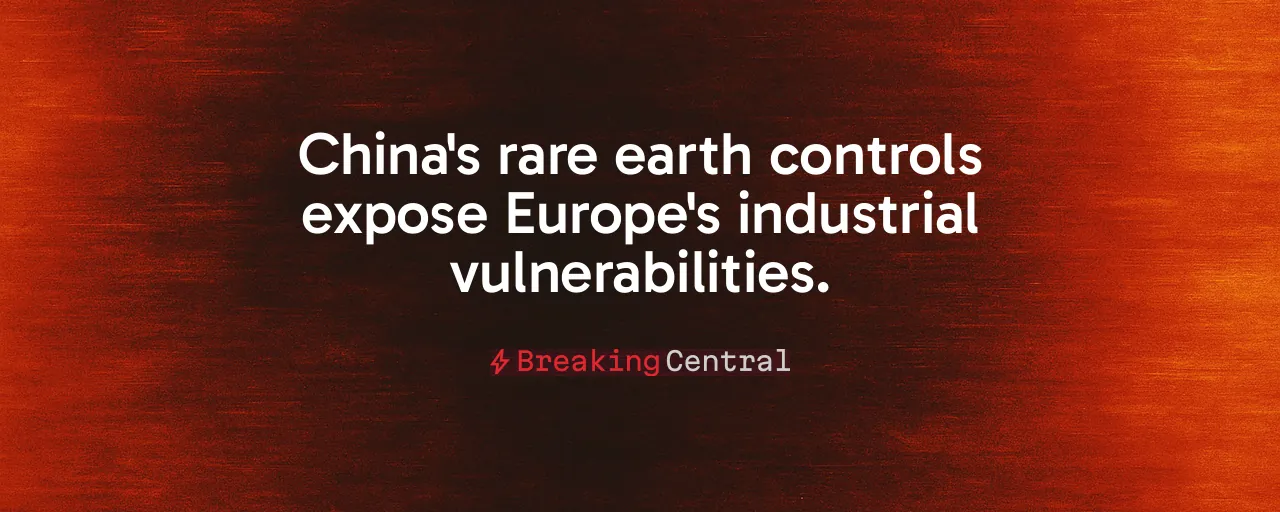A Strategic Squeeze on Europe's Industries
China's decision to ease rare earth export approvals for European companies, announced in June 2025, grabbed headlines as a diplomatic win. After months of delays that crippled auto plants and clean-energy projects, Beijing's 'green channel' promises faster licenses for select firms. This move appears to be a calculated play, not an act of generosity. With nearly 90 percent of global rare earth processing under its control, China holds a chokehold on materials vital to everything from electric vehicle motors to missile systems. The real question is why Europe remains so exposed to Beijing's whims, even with this latest concession.
The disruptions began in April 2025, when China imposed strict export controls on seven medium- and heavy rare earth elements, citing national security. European manufacturers, heavily reliant on these materials for permanent magnets, faced chaos. Factories in Germany, France, and Spain shut down temporarily, with only a quarter of license applications approved in the first two months. The impact was stark: a 48 percent drop in export value by May, despite stable volumes, showed Beijing selectively tightening the screws on high-value elements like dysprosium. For Europe, this was a harsh reminder of its industrial Achilles' heel.
The Cost of Dependence
Europe's vulnerability is not new. China has flexed its rare earth dominance before, most notably in 2010 when it halted exports to Japan during a territorial dispute. That embargo sent prices soaring and forced global markets to scramble. Fast forward to 2025, and the playbook remains eerily similar. Dysprosium oxide prices spiked 25 percent in a single week in May, hammering manufacturers. The six-month licenses now offered through China's 'green channel' are revocable, leaving firms at the mercy of Beijing's next geopolitical move. This supply chain is unreliable, amounting to strategic blackmail.
The stakes extend beyond economics. Rare earths are critical for defense systems, from radar to precision-guided munitions. Europe's reliance on a single foreign supplier, especially one with a track record of using resources as leverage, compromises national security. Factory slowdowns also threaten tens of thousands of manufacturing jobs, hitting communities already battered by global competition. The European Commission estimates that prolonged disruptions could shave 0.3 percent off EU GDP, a hit that ripples through supply chains for wind turbines, robotics, and more.
Breaking Free Through Self-Reliance
Reducing dependence is the solution, rather than begging for faster approvals. Europe needs to rapidly expand its own mining and processing capabilities. Countries like Australia, Canada, and the United States have untapped deposits and could become trusted partners. The International Energy Agency projects a tripling of global rare earth demand by 2030, with heavy elements facing the steepest shortages. Waiting 12 to 16 years to permit a new mine, as is typical in Europe, is no longer an option. Streamlined regulations and targeted subsidies can accelerate projects without sacrificing environmental standards.
Recycling offers another path. The EU could meet up to 20 percent of its rare earth needs through recovery programs by 2030, but this requires investment in reverse-logistics and refining technologies. Strategic stockpiles, coordinated with NATO allies, would buffer against sudden supply shocks. These steps demand upfront costs, but the alternative, continued reliance on an unpredictable supplier, is far riskier. Trans-Atlantic cooperation, leveraging North American resources and expertise, could further strengthen resilience.
Trade Tools and Tough Choices
Europe cannot ignore trade defenses. The European Commission is considering tariffs on Chinese electric vehicles, a response to Beijing's market distortions. Such measures, while risky, signal resolve. China's export controls may comply with global trade rules on paper, but their selective enforcement raises questions about fairness. The EU could challenge these practices at the World Trade Organization while building alliances with like-minded nations to counter China's dominance. Policymakers in Brussels, led by figures like Maroš Šefčovič, need to balance diplomacy with decisive action.
The automotive sector, represented by groups like ACEA and CLEPA, is vocal about the need for stable supply chains. Companies like Volkswagen, Renault, and BMW face both production delays and rising costs that erode competitiveness. Meanwhile, defense contractors warn of vulnerabilities in military supply chains. The urgency is clear: Europe needs to act swiftly to secure its industrial base and protect its strategic interests.
A Call for Action
China's rare earth controls are a wake-up call. Europe's industries, jobs, and security hang in the balance, and short-term fixes like the 'green channel' are bandages on a deeper wound. The path forward requires bold investment in domestic mining, recycling, and allied partnerships. Trade tools, from tariffs to WTO challenges, need to back these efforts. High costs are involved, but the price of inaction is higher still.
This moment demands leadership. Policymakers, manufacturers, and allied nations need to unite to build a resilient supply chain free from foreign leverage. The disruptions of 2025 are a preview of what awaits if Europe fails to act, not an anomaly. By prioritizing self-reliance and strategic coordination, the EU can turn vulnerability into strength.
The rare earth crisis is a test of resolve, not merely a trade dispute. Europe has the resources, expertise, and allies to meet this challenge. Now is the time to move, before the next squeeze tightens.
